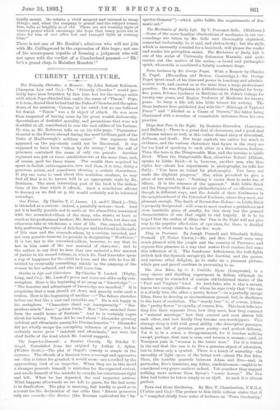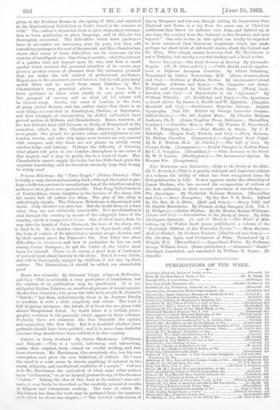Town and Home Gardening. By Mrs. T. Chamberlain, F.B.H.S. (Virtue
and Co.)—The preface to this little voluine states that it is "compiled chiefly from notes of lectures on 'Town Gardening,' given at the Portman Rooms in the spring of 1891, and repeated. at the Horticultural Exhibition at Earl's Court in the summer of 1892." The author's object has been to give elementary informa- tion on town gardening in plain language, and in this she has thoroughly succeeded. The difficulties which town gardeners have to encounter are increasing year by year, but they add something perhaps to the zest of the pursuit, and Mrs. Chamberlain shows that many of these difficulties can be overcome by the exercise of intelligent care. One thing is certain,—that the interest of a garden does not depend upon its size, and that a small garden which receives the personal attention of its owner, may prove a greater source of pleasure than the extensive grounds that are under the sole control of professional gardeners. Experience is the amateur's surest teacher, but he *will gain many useful hints and be saved from many blunders by Mrs. Chamberlain's very practical advice. It is a boon to the town gardener to know what plants he can grow with a fair prospect of success, and on what all his labour will be thrown away. Smoke, the curse of London, is the bane of many choice flowers, and the author states that there is no such thing as a rose-bud in Kensington, Chelsea, or Bayswater, and that attempts at rose-growing by skilful cultivators have proved useless at Kilburn and Brondesbury. Roses, however, of the less delicate kind still blossom as freely at Hampstead as the carnation, which, as Mrs. Chamberlain observes, is a capital town plant. She pleads for greater colour and brightness in our London streets, and asks why many more houses are not covered with creepers, and why there are not plants on nearly every window-ledge and balcony. Perhaps the difficulty of knowing what plants will grow in our London atmosphere is one cause of this neglect, and it may be partly due to a want of taste. Mrs. Chamberlain cannot supply the taste, but her little book gives the requisite knowledge, and we therefore sincerely hope that it may be widely read.



















































 Previous page
Previous page